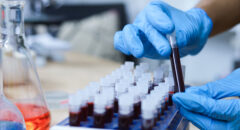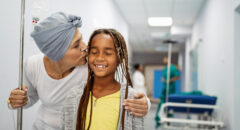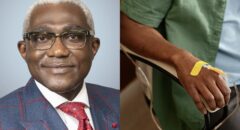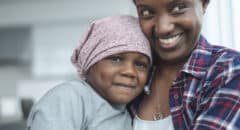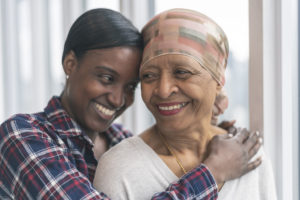
Acute myeloid leukemia (AML) is a cancer of the blood cells that mostly strikes older adults. According to the American Cancer Society, nearly 20,000 Americans will be diagnosed with the disease this year. Over 10,000 will die of it.
An experimental therapy that revs up the immune system's cancer-fighting ability may help treat some leukemia patients who face a grim prognosis, a small study suggests.
The treatment involves infusions of "natural killer" (NK) cells taken from a healthy donor and chemically "trained" to go after tumor cells.
Researchers found that of nine patients with AML who received the therapy, four went into complete remission for as long as six months.
The findings are preliminary, and the therapy remains experimental, the researchers pointed out.
But experts said the results are encouraging considering the outlook these AML patients faced before the trial. Their cancer had either failed to respond to standard chemotherapy or had come back, and they had run out of options.
"When you see this kind of response in these patients, it's provocative," said Dr. Todd Fehniger. He's the study's senior researcher and an associate professor of medicine at Washington University in St. Louis.
But he also urged caution: The early phase trial was designed primarily to test the NK therapy's safety. Larger, longer-term trials are needed to prove that it can be a viable treatment, according to Fehniger.
Other leukemia experts agreed.
"This certainly shows there is promise here," said Dr. Jae Park, an oncologist at Memorial Sloan Kettering Cancer Center, in New York City.
Park, who was not involved in the study, specializes in treating leukemia and researching new treatment options. He said there are still big questions about the NK therapy, such as how long does it last, what's the optimal dose and how often does it need to be repeated?
Still, Park called the early results "hopeful and encouraging" in the context of a cancer that remains challenging to treat.
Chemotherapy is the main treatment for AML, but it cures less than 30 percent of patients, according to Fehniger. When people don't respond to chemotherapy, or the cancer comes back, it is sometimes possible to do high-dose chemotherapy that wipes out the bone marrow (which gives rise to blood cells), then perform a bone marrow transplant from a compatible donor.
But that's a risky procedure, and frail older adults are often not candidates, Fehniger said.
Dr. Craig Devoe, acting chief of medical oncology and hematology at Northwell Health Cancer Institute in Lake Success, N.Y., noted that "AML has been pretty barren of new therapies, so there's a huge unmet need here."
Devoe, who wasn't involved in the new study, agreed that the NK therapy still has to be proven.
"But," he said, "the fact that four out of nine patients had a complete remission is encouraging. This is something that needs to be investigated further."
The NK therapy is a new form of "immunotherapy", which refers to any treatment that harnesses the immune system's natural tumor-fighting abilities.
Other types of immunotherapy have already been showing promise against various types of cancer, including other forms of adult leukemia.
In this case, Fehniger's team tried to enhance the inherent capabilities of natural killer cells, which normally go after tumor cells and infected body cells – but cannot always win.
The researchers started with NK cells donated by patients' close relatives. Those cells were incubated overnight in a mixture of three immune system chemicals; past research had shown that the chemicals – called interleukins 12, 15 and 18 – activate NK cells in the body.
Fehniger likened the process to "soldiers going through boot camp." When the NK cells are injected into AML patients, they are primed to fight the cancer cells they encounter.
Since the NK cells didn't come from the patients' bodies, patients first need a round of chemotherapy to keep their own immune systems from immediately rejecting the cells.
That gives the NK cells a "window of opportunity" to multiply and go after the cancer, Fehniger explained. "After about two to three weeks, they're eliminated by the patient's immune system," he said.
That, he noted, could be both positive and negative: On one hand, the cells have a limited time to work. On the other, they're not left to "hang around" in the patient's body.
Of nine AML patients who were given the therapy and could be followed, four had a complete remission.
Meaning there were no signs of the cancer in their bodies for up to six months. A fifth had a partial remission.
There were no major safety problems, according to Fehniger. Patients had only mild side effects, such as a slight fever.
The next step, Fehniger said, is to test the NK therapy in a larger number of patients, at the highest dose used in this initial study.
The researchers also plan to study NK cells in combination with other therapies, including "mini" bone marrow transplants which are a less-intense procedure that uses lower chemo doses, and may be more feasible for older, sicker patients.
For more information on acute myeloid leukemia, visit our Health Conditions page on BlackDoctor.org.
SOURCES: Todd Fehniger, M.D., Ph.D., associate professor, medicine, Washington University School of Medicine, St. Louis; Jae Park, M.D., hematologic oncologist, Memorial Sloan Kettering Cancer Center, New York City; Craig Devoe, M.D., acting chief, medical oncology and hematology, Northwell Health Cancer Institute, Lake Success, N.Y.; Sept. 21, 2016, Science Translational Medicine




